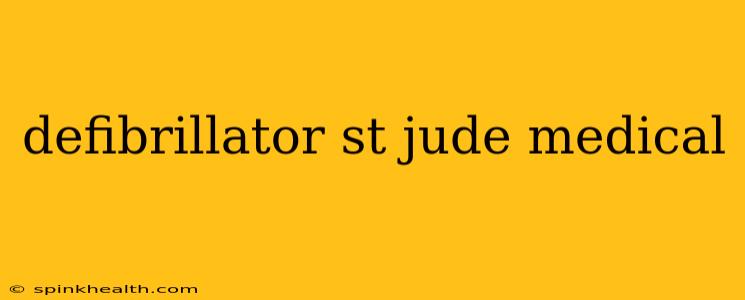A Life-Saving Beat: Understanding St. Jude Medical Defibrillators
The rhythmic thump-thump-thump of a healthy heart is something most of us take for granted. But for millions worldwide, a malfunctioning heart puts life itself on a precarious tightrope. This is where implantable cardioverter-defibrillators (ICDs), like those manufactured by St. Jude Medical (now part of Abbott), step in as silent guardians, ready to deliver a life-saving shock when needed. Let's delve into the world of St. Jude Medical defibrillators, exploring their functionality, benefits, and common concerns.
What is a St. Jude Medical Defibrillator?
A St. Jude Medical defibrillator is an implantable device designed to monitor a patient's heart rhythm and deliver an electrical shock (defibrillation) if it detects a life-threatening arrhythmia, such as ventricular fibrillation or ventricular tachycardia. These are irregular heartbeats that can lead to sudden cardiac arrest – a condition where the heart suddenly stops beating effectively. Think of it as a tiny, highly sophisticated, and incredibly vital pacemaker with a powerful backup system. The device is surgically implanted beneath the skin, usually in the chest area, and connected to the heart via leads.
How Does a St. Jude Medical Defibrillator Work?
The device continuously monitors the heart's rhythm. If it detects a dangerous arrhythmia, it first attempts to correct it by delivering pacing impulses (much like a pacemaker). If these pacing impulses are unsuccessful in restoring a normal rhythm, the defibrillator will deliver a carefully timed and measured electrical shock to the heart to restore its normal beat. This shock, while startling, is necessary to save the patient's life.
What are the Benefits of a St. Jude Medical Defibrillator?
The primary benefit is the life-saving potential. For individuals at high risk of sudden cardiac arrest, an ICD significantly reduces the risk of death. Beyond this critical function, modern St. Jude Medical defibrillators offer advanced features, such as:
- Remote monitoring: Many models allow for remote monitoring of the device's performance and the patient's heart rhythm, allowing for early detection of potential problems.
- Improved battery life: Advances in technology have led to significantly longer battery life, reducing the frequency of necessary replacements.
- Smaller and more comfortable design: Newer ICDs are smaller and more discreet, improving comfort for the patient.
What are the Risks and Side Effects of a St. Jude Medical Defibrillator?
Like any medical procedure, there are potential risks and side effects associated with the implantation of a St. Jude Medical defibrillator. These can include:
- Infection at the implant site: This is a relatively common risk with any surgical procedure.
- Bleeding or hematoma at the implant site: This is another common surgical risk
- Lead malfunction: The leads that connect the device to the heart can occasionally malfunction.
- Shock discomfort: While life-saving, the shocks can be uncomfortable. Modern devices are designed to minimize discomfort.
What is the lifespan of a St. Jude Medical Defibrillator battery?
The battery life of a St. Jude Medical defibrillator varies depending on the model and the patient's individual needs. However, most devices have a battery life of several years. Regular follow-up appointments with a cardiologist are crucial to monitor battery life and overall device function.
How often do St. Jude Medical Defibrillators need to be replaced?
The need for replacement depends on battery life and overall device function. Regular checkups with a cardiologist are essential to determine when a replacement is necessary. The doctor will monitor the battery level and the device's performance to determine the optimal time for replacement.
What are the different types of St. Jude Medical Defibrillators?
St. Jude Medical (now Abbott) offers a range of ICDs with varying capabilities and features tailored to individual patient needs. These differences may include battery life, sensing capabilities, and therapy options. The specific type of ICD recommended will depend on factors like the patient's medical history and heart condition. Specific device details are best discussed with a cardiologist.
In conclusion, St. Jude Medical defibrillators represent a significant advancement in cardiac care, providing a crucial safety net for individuals at risk of sudden cardiac death. While there are associated risks, the life-saving benefits often outweigh these concerns. If you or someone you know has been diagnosed with a heart condition that may benefit from an ICD, it's crucial to consult with a cardiologist to discuss the options and make an informed decision. Remember, this information is for general knowledge and should not be considered medical advice. Always consult with your healthcare provider for personalized guidance.

